Zack Read online
Praise for Mons Kallentoft
“The latest hot Swedish import.”
—Entertainment Weekly
“A splendid representative of the Swedish crime novel, in all its elegance and eeriness.”
—Booklist, starred review of Midwinter Blood
“The highest suspense.”
—Camilla Lackberg, internationally bestselling author of The Ice Child
“Kallentoft is gifted. . . . He has a knack for characterization and describing the slow burn of police work.”
—The Age (Australia)
“Kallentoft writes vividly and harshly.”
—The Washington Times
“Edgy.”
—Library Journal
“One of the best-realized female heroines I’ve read by a male writer.”
—The Guardian (UK) on the Malin Fors series
“One of those books that will keep you up throughout the night. . . . Make room on your shelf—and calendar—for this one.”
—Bookreporter.com on Autumn Killing
“Evocative, atmospheric, ingenious.”
—Kirkus Reviews on Summer Death
“A sizzling, heart-pounding murder mystery and a masterful work of literary fiction with a compelling female character at its center.”
—The Paramus Post on Summer Death
“Gritty. . . . Utterly convincing.”
—Publishers Weekly, starred review of Summer Death
Thank you for downloading this Simon & Schuster ebook.
* * *
Get a FREE ebook when you join our mailing list. Plus, get updates on new releases, deals, recommended reads, and more from Simon & Schuster. Click below to sign up and see terms and conditions.
CLICK HERE TO SIGN UP
Already a subscriber? Provide your email again so we can register this ebook and send you more of what you like to read. You will continue to receive exclusive offers in your inbox.
Who will fetch the man-eating mares?
Who will slay Diomedes, the Thracian king?
Who will rescue the innocent?
Our hero, our hero, our hero.
Prologue
1999
THE TWELVE-YEAR-OLD boy is lying on his back in the wild grass, breathing heavily.
The August night is dark and warm.
The iron-tainted smell of fresh blood mixes with the flowers in the meadow, and he looks at the vast sky with big, wide-awake eyes.
The whole sky seems to be full of shimmering dots. Even within celestial bodies like Ursa Major, Cassiopeia, and Orion, there are masses of other smaller stars fighting for space. There’s a long stripe across the sky where the stars are so tightly concentrated that they form a white fog.
The Milky Way.
The boy’s middle-school teacher once said that the sun is just an insignificant dot on the edge of the Milky Way galaxy. And if the sun was just an insignificant dot, what did that make the Earth? A grain of sand, barely worth even noticing.
It had been difficult to take in. It was like nothing you ever did mattered.
Now, as the boy lies in the meadow staring up at incomprehensible infinity, he wishes that were the case. That nothing really mattered. That what happened this evening could just disappear into the galaxy’s vast maelstrom of things that don’t matter.
The other person is lying just a few yards away in the tall grass. The boy doesn’t dare turn his head and look.
He coughs, feeling the pain in his ribs. The damp is starting to seep through his T-shirt, and he is suddenly aware of the loud chirruping of the crickets. He doesn’t like the sound. It’s like they’re telling tales:
“He’s here! We can see him!”
The boy knows he can’t lie here any longer. He needs to move. But he’s so incredibly tired.
He can feel his body being pressed into the ground, as if the world were accelerating. The stars are getting closer. The white streak of the Milky Way is growing clearer, as are the hideous faces hidden in the dark gaps in the space dust.
Just take me away from here. Out into space. Out into the vastness of forgetting.
PART I
* * *
About how the forgotten are destroyed,
How hungry jaws open,
And how those still living scream in the underworld.
1
STOCKHOLM 2014
THE HEAT in the old shipyard is almost unbearable.
Spilled oil sticks to people’s shoes on the crowded dance floor, and the air is almost too humid for sweat to escape.
There are no windows, no one knows that the morning sun has started to light up the shabby brick walls. There is no closing time here, no last orders at the bar. The organizer keeps going for as long as he thinks it’s worth it—or until the police show up. It’s an ordinary Sunday night in the middle of June, but Stockholm’s nocturnal angels are beating their wings like never before.
The DJ slowly builds up the intensity and the speed of the bass gets faster. The dance floor responds with a cheer and the temperature inside the old assembly hall rises still higher.
A young man close to the center of the dance floor has stripped his top off. He’s dancing with the self-confidence of someone who doesn’t care what anyone else thinks. Some of his blond hair is stuck to the sweat on his forehead, and as he brushes it away the gesture is watched by a number of women. They scan his face, then move lower to his smooth athletic, naked torso. And like what they see.
Two women make repeated attempts to get eye contact with him. They’re in their twenties, one has a straight blond bob, the other long dark hair. They’re both wearing tight dresses that stop at the top of their thighs.
They’re whispering to each other, describing the way he looks as though he were a god, with his full lips and straight, prominent nose. Like the hero in some old-fashioned book for girls, or an ancient Greek drama. He glances briefly back at them. Nothing more. All he wants to do right now is dance. Surrender his body to the rhythmic looping music and free his soul from all thought and feeling.
He takes a swig from the bottle of beer clutched in his hand, looks around. Suddenly his face cracks into a broad smile and his eyes light up. He takes a few steps forward and stumbles over a cable, but regains his balance and heads toward the dark-haired woman. For a few brief seconds she seems to be wondering what to say to him, then she gets pushed aside by a thickset man in a black vest forcing his way past her from behind. The two men raise their right arms in the air and their palms meet in a powerful slap. They embrace, and the thickset man says something into the blond man’s ear. He nods in response and they push their way off the dance floor.
* * *
THE MEN’S rooms stink of piss from the rusty trough of the urinal, and the tiled walls are covered with tags and stickers advertising underground clubs and obscure websites.
The door closes behind them and the noise is muffled to such an extent that they no longer have to shout in each other’s ears. The bare-chested man grabs hold of his friend’s huge shoulders and gives him a gentle shake.
“Fuck, Abdula, it’s good to see you! I was starting to think you were never going to show up.”
“Oh, you know, had some things to do.”
“At this time of day?”
Zack looks at his watch. Three thirty-five.
“You’re working late.”
Abdula smiles.
“Whatever it takes to get good stuff for my friend.”
He opens the door to one of the three cubicles and makes a theatrically low bow.
“After you, Monsieur Herry.”
The toilet lid is covered with little scratches from razor blades and other sharp objects. Abdula empties a small transparent bag and chops t
he contents up with a Visa card from Nordea Bank. Zack can’t help looking at the card as the cocaine is cut.
“KHAN, ABDULAH,” it says below the sixteen digits.
He knows that his friend actually spells his name differently, but the Tax Office managed to get both names wrong when the Kahn family arrived in Sweden in 1993. Years later Abdula tried to get them to correct their mistake, which they were prepared to do—for several thousand kronor. Abdula chose to carry on having his name misspelled.
“There you go. Dig in!” he says, passing a thick pink straw to Zack.
Zack looks at his friend in surprise.
“What the fuck’s this? Have you started snorting coke with straws from McDonald’s?”
“Not McDonald’s. Theirs are too long and thin. This one’s from the new milk-shake place at Hornstull. They’re a bit too long, so I cut them in half. Then they’re the perfect size.”
“Yeah, but what the fuck, why use straws at all? Pink ones, at that?! What happened to the chrome tube you had in that gorgeous little case?” Zack asks, with sarcastic stress on the word gorgeous.
“The cops, you know. If you’ve got something like that in your pocket, they go ballistic at once, even if you’re completely clean.”
“Yeah, yeah. Give it here, then,” Zack says, snatching the straw.
He lowers his nose to it and inhales sharply as he moves the straw along the line.
They sit on the cramped cubicle floor next to the toilet for a while, just looking at each other as they wait for the cocaine to kick in.
Thoughts become focused again. Vision gets clearer. Everything’s fine. Everything’s great. The world has sharply chiseled edges.
Zack looks into Abdula’s eyes. He knows plenty of people, but only has one real friend. And they’ve been through a hell of a lot together. Years of madness, hardship, and constant struggle. And love, brotherly love.
I’d take a bullet for you, Zack thinks.
He feels his chest lurch at the thought. Abdula meets his gaze and it’s as if he can read his friend’s mind. He nods gently back at him.
* * *
BACK ON the dance floor. There’s hardly any oxygen left in the hot, sticky air. The boundary between agony and ecstasy is slowly dissolving.
The monotonous beat is driving Zack crazy. Crazy in a good way. His chest is dripping with sweat and his blond hair is getting curlier in the humid air. Two girls are dancing right next to them. The blonde and the brunette. Shoulder bumping against shoulder. Thigh against thigh. The music is pumping. Another visit to the toilet. Four people squeezed into the cubicle. The Visa card like a woodpecker on the toilet lid. The girls giggle. Take the first lines. Their low-cut tops hide virtually nothing as they bend over. They toss their heads back, their hair flying, and instinctively put their hands to their nostrils. Straighten up. Bodies pressed tightly in the cramped space. Lips meeting. Tongues.
* * *
“DID HE use his tongue when he kissed you?”
The three Asian women are giggling in delight on the shabby sofa in the living room of the apartment out in one of the mass-housing projects in Hallonbergen. The Mekong whiskey has had the usual effect. The atmosphere is considerably lighter now.
“What a question! I’m not saying,” says the young woman kneeling on a cushion on the other side of the coffee table, but her shy smile gives her away.
“But, Mi Mi, you’re only eighteen,” the oldest woman in the room says, pretending to be upset, and the other two women giggle again.
“Unless perhaps you were only seventeen when it happened?”
“No, I’d had my birthday. It was in October. October sixteen,” she says, losing herself in the memory.
Four tea lights are floating in a dish of water on the table, spreading a shimmering glow over the terracotta-colored wallpaper. The room smells vaguely of coriander, chili, rice, and dried fish after the evening meal.
The rice whiskey on the table is starting to run out, as is the two-quart bottle of Coca-Cola. The last bag of chips is empty.
The women are tired, their bodies ache. They ought to get some sleep, but it’s good to sit up late and just relax for a while. They talk almost exclusively about life back home, about the ongoing floods that have struck so many villages in their old home district, about the children living with grandparents.
But it hurts, talking about their children and families. They never feel farther from home than when they do that. It’s nice to focus on an eighteen-year-old girl’s romantic concerns instead.
Forty-three-year-old Daw Mya leans forward and refills her glass. A bit of Mekong at the bottom, then plenty of Coke. She turns to Mi Mi.
“Any more for the queen of tongue kissing?”
Mi Mi blushes and the others giggle loudly once again. She remembers the evening by the river. The way Yan Naing’s body seemed simultaneously hard and soft. Warm as the night around them. His lips and tongue even warmer, as moist as the rain on the first days of the monsoon.
* * *
THE WOMEN’S laughter spreads through the summer night from the open living-room window. A lone man is marching with firm strides along the path below. He looks up briefly toward the window before taking a shortcut through the playground toward the door.
A broken swing is spinning slowly on its one remaining chain. On the rotting wooden frame of the sandbox there are fragments of green glass from a broken bottle.
The apartment block is large and unwelcoming, like a concrete bunker. One of a row of identical buildings. Beige brick façades, dark gray balconies. Satellite dishes everywhere.
The elevator is out of order, but he would have taken the stairs even if it had been working. Doesn’t want to make more noise than necessary.
Somewhere a dog is barking. A bag of trash outside a door on the third floor spreads a smell of rotten fish through the stairwell. He goes up one more floor and stops outside a door on which someone has sprayed the words DEATH TO ALL NIGGERS in black paint. There’s nothing else on it. No number, no name, just the gluey remnants of a torn-off nameplate on the mailbox.
He pushes the handle down cautiously, expecting it to be locked, but the door swings open.
The living room is hidden from the hall, but the women’s chatter can be heard clearly through the doorway to his right. He sees flickering light on the wall, then a gilded Buddha on a shelf, surrounded by four tea lights in lilac candleholders.
Mi Mi stiffens when she sees the strange man step into the room with a pistol in his hand. She wants to scream but can’t, and when she realizes that it’s too late—that everything ends here—a rapid sequence of memories flashes through her head. Splashing and laughter as she swims in the Gyaing River with her cousin Myat Noe, her first trip to the big market in Pa-an, the rain on the day of her exams, Grandma’s wrinkled hands in her hair, Yan Naing’s hands on her body, and his friendly, hungry eyes, the look she wants to remember forever. And then the light of the street lamps flickering past the gap in the tarpaulin covering the back of the truck after she had said her tearful farewells to her family in the camp.
Farewell to Yan Naing.
It’s so cramped and uncomfortable lying there with all those strangers. The lights flicker past faster and faster.
* * *
IN THE end the flickering light of the stroboscope gets to be too much. The lightness induced by the cocaine has faded and Zack can feel everything getting too close, bodies, sweat, desire. He says a quick good-bye to Abdula, then swerves elegantly through the dancing crowd and practically runs down the heavy old wooden staircase toward the big metal door. A bouncer with steroid-pumped biceps pulls it closed behind him and the noise finally shrinks to a muffled thud, and he suddenly finds himself in the middle of a dreamlike summer’s morning.
Daylight, sunshine, birdsong.
He takes deep breaths of the fresh summer air, astonished at how beautiful the morning is and how alive the world feels. Then he starts to walk toward the city. A cool breeze fro
m the sea caresses his face and bare chest, making the hairs on his arms stand up. Then he remembers that his top is still hanging on a railing back inside.
He hesitates for a moment. Should he go back and get it, force his way back into that boiling cauldron of sweat?
He looks up at the enormous building he has just left and suddenly feels very small. Huge, solid, and industrial, it looms above him in an almost eerily oppressive way. A remnant of a former age that refuses to surrender its pride. That refuses to recognize that there’s no need for heavy industrial complexes at this latitude.
The large lettering on the wall has almost peeled off, but the outline is still legible.
HERALDUS.
Zack wonders why the powerful industrial conglomerate has left the building to stand derelict and decaying. As a memorial to a bygone era, perhaps? Or a monument to a failure that mustn’t be forgotten? Maybe it was just an illustration of the company’s fabled ability to change direction rapidly: okay, there’s no more money to be had here. Let’s pull down the shutters and move on to the next gold mine.
The muffled thud of the bass is making some windows toward the top of the building rattle. He wonders if the company’s management knows that the old shipyard has been transformed into a sweaty underground club.
He turns around again and carries on toward the city. His T-shirt can stay where it is.
Thin strands of steam rise from the tarmac as it heats up in the morning sunlight. The water lies motionless beyond the reeds. On the other side of the inlet there are huge houses, row upon row of them. Luxurious new buildings with panoramic windows facing the water. Old stone buildings that look like manor houses, with heavy pillars holding up the roofs above their doorways. Overblown white motorboats moored at private jetties.
Who lives like that? he thinks. Rock stars? Hockey players who’ve moved back home from Canada?

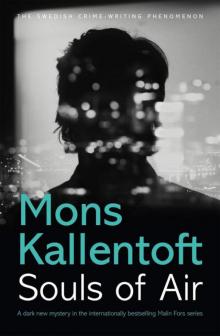 Souls of Air (Malin Fors 7)
Souls of Air (Malin Fors 7)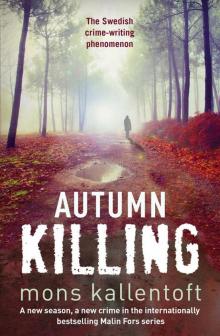 Autumn Killing dimf-3
Autumn Killing dimf-3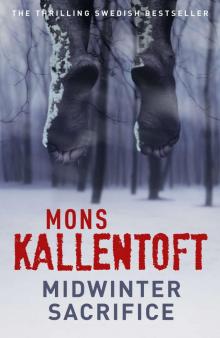 Midwinter Sacrifice
Midwinter Sacrifice Earth Storm_The new novel from the Swedish crime-writing phenomenon_Malin Fors
Earth Storm_The new novel from the Swedish crime-writing phenomenon_Malin Fors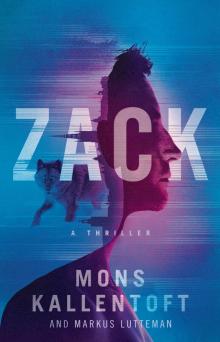 Zack
Zack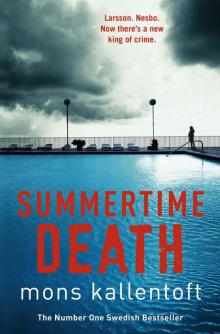 Summertime Death
Summertime Death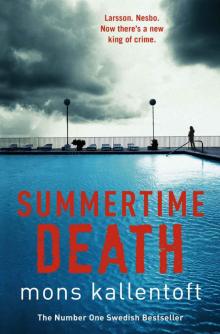 Summertime Death mf-2
Summertime Death mf-2